Last of three parts
DAVAO CITY (MindaNews / 09 August) — Alim Bandara, council member of the Teduray Justice and Governance told MindaNews that the process of delineation started 15 years ago, on August 26, 2005, when the Teduray, Lambangian and Dulangan Manobo Ancestral Domain Conference (TLADMADC) represented by him as Timuay Labi and head claimant, filed a petition for recognition, delineation, segregation and the issuance of a Certificate of Ancestral Domain Title (CADT) covering an area of about 201,850 hectares of the municipalities of Upi, South Upi, and southern portions of the municipalities of Datu Odin Sinsuat, Talayan, Guindulungan, Datu Unsay, Shariff Aguak, and Ampatuan in the province of Maguindanao.
Bandara said their claim was endorsed to the National Commission on Indigenous Peoples (NCIP) by Victoria Kanakan, Director of the Office of Southern Cultural Communities (OSCC) in the Autonomous Region in Muslim Mindanao on August 30, 2005, the document received by the NCIP’s Ancestral Domain Office (ADO) in the national capital on September 13. At that time, he said, Timuay Melanio Ulama, now Minister of Indigenous Peoples’ Affairs in the Bangsamoro Autonomous Region in Muslim Mindanao (BARMM) was Kanakan’s Executive Assistant.
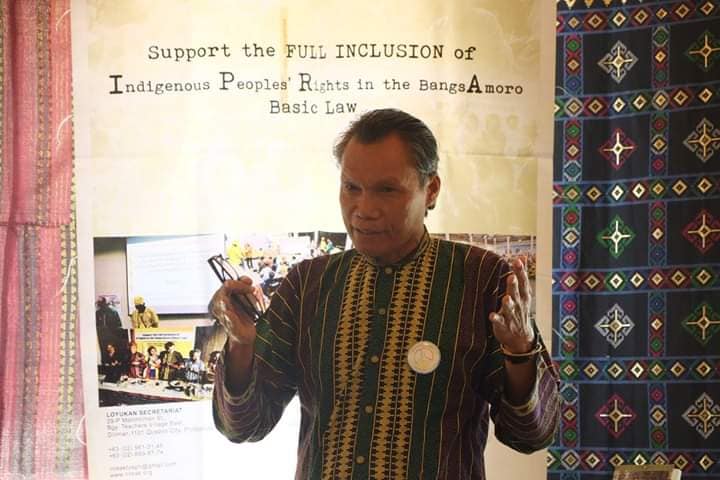
Timuay Alim Bandara, Council Member of the Teduray Justice aand Governance, head claimant of their ancestral domain claim filed in 2005. Photo from his FB page posted by Jenny Catuyan
According to Bandara, there was no action on their application for nearly a decade due to jurisdiction issues which he said were finally resolved only in 2013 and “officially ang ground processing started in 2014,” under the Aquino administration and under then ARMM Governor Mujiv Hataman.
Bandara said the actual survey was conducted from 2016 to 2017 and technical processing of the survey report was done from 2018 to 2019 under the Duterte administration.
On August 30, 2019, five months after the BARMM was inaugurated, then NCIP-12 Director Jeanne Anne Zoilo sent a letter of transmittal of the survey returns of the Teduray Lambangian’s application, to Michael Mamukid, then Director of the ADO in the central office in Quezon City.
Bandara said that the ADO, upon receipt of the survey returns, is expected to make a verification report to NCIP Regional Office 12 then the regional office will endorse their claimbook for the NCIP’s en banc deliberation. He said as claimant IPs, they will then defend before the en banc session everything that has been done by the delineation team before their CADT is awarded to them. The NCIP, he said, will remove from their claim hectares of titled lands within their claimed domain as they will not be part of their CADT.
But Resolution 38 of the Bangsamoro Transition Authority (BTA) on September 25, 2019, however, effectively stopped the processing of their CADT.
Bandara said this created a problem because there is no enabling law yet for the non-Moro Indigenous Peoples in BARMM and the NCIP “is not also responding to the BTA resolution.”
According to Bandara, there was no action on their application for nearly a decade due to jurisdiction issues which he said were finally resolved only in 2013 and “officially ang ground processing started in 2014,” under the Aquino administration and under then ARMM Governor Mujiv Hataman.
Bandara said the actual survey was conducted from 2016 to 2017 and technical processing of the survey report was done from 2018 to 2019 under the Duterte administration.
On August 30, 2019, five months after the BARMM was inaugurated, then NCIP-12 Director Jeanne Anne Zoilo sent a letter of transmittal of the survey returns of the Teduray Lambangian’s application, to Michael Mamukid, then Director of the ADO in the central office in Quezon City.
Bandara said that the ADO, upon receipt of the survey returns, is expected to make a verification report to NCIP Regional Office 12 then the regional office will endorse their claimbook for the NCIP’s en banc deliberation. He said as claimant IPs, they will then defend before the en banc session everything that has been done by the delineation team before their CADT is awarded to them. The NCIP, he said, will remove from their claim hectares of titled lands within their claimed domain as they will not be part of their CADT.
But Resolution 38 of the Bangsamoro Transition Authority (BTA) on September 25, 2019, however, effectively stopped the processing of their CADT.
Bandara said this created a problem because there is no enabling law yet for the non-Moro Indigenous Peoples in BARMM and the NCIP “is not also responding to the BTA resolution.”
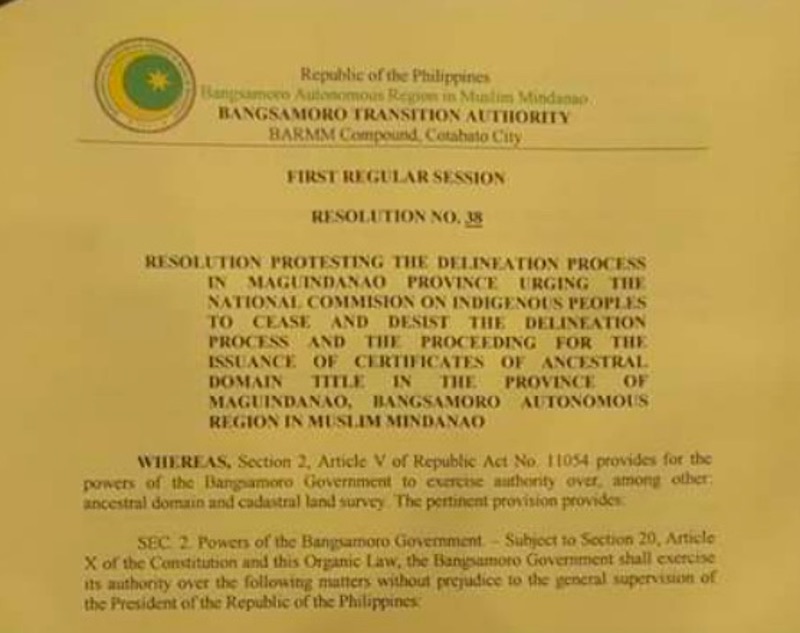
BTA Resolution No. 38, passed on 25 September 2019.
Bangsamoro Member of Parliament Saliga told MindaNews that the issue has been elevated to the Inter-Governmental Relations Body (IGRB) between the Bangsamoro region and the national government and what was being considered was a Joint Technical Working Group between the MIPA and the NCIP.
Mohagher Iqbal, peace panel chair of the Moro Islamic Liberation Front who signed the peace agreements in 2012 and 2014 and is now the Minister for Basic, Higher and Technical Education and head of the IGRB for the MILF, told MindaNews that there have been “initial discussions but more rounds are needed.”
IP Code for all
RA 11054 provides that the BTA “shall enact law to recognize, protect , promote, and preserve the rights of indigenous peoples” in the BARMM and that “until the law is enacted, subsisting regional laws on the indigenous peoples in the Bangsamoro shall be operational.”
It has been 10 months since Resolution 38 was passed but where is the promised IP Code?
Bangsamoro Member of Parliament Saliga told MindaNews that the issue has been elevated to the Inter-Governmental Relations Body (IGRB) between the Bangsamoro region and the national government and what was being considered was a Joint Technical Working Group between the MIPA and the NCIP.
Mohagher Iqbal, peace panel chair of the Moro Islamic Liberation Front who signed the peace agreements in 2012 and 2014 and is now the Minister for Basic, Higher and Technical Education and head of the IGRB for the MILF, told MindaNews that there have been “initial discussions but more rounds are needed.”
IP Code for all
RA 11054 provides that the BTA “shall enact law to recognize, protect , promote, and preserve the rights of indigenous peoples” in the BARMM and that “until the law is enacted, subsisting regional laws on the indigenous peoples in the Bangsamoro shall be operational.”
It has been 10 months since Resolution 38 was passed but where is the promised IP Code?
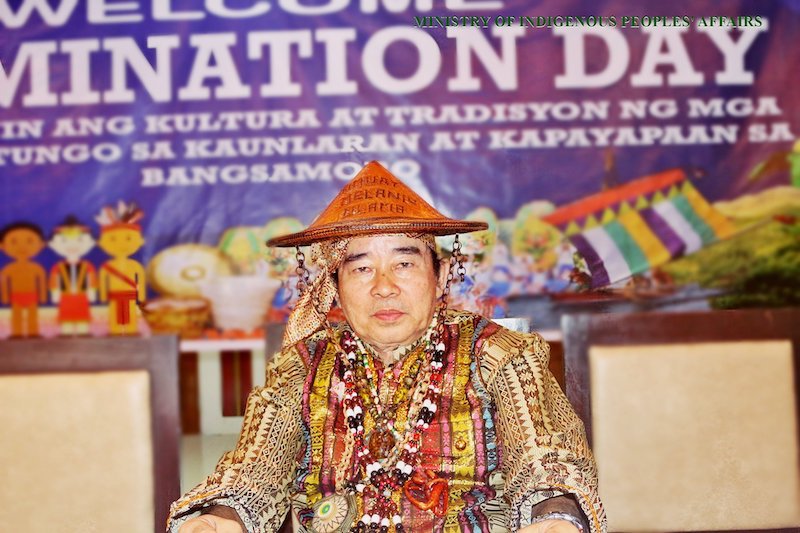
Timuay Melanio Ulama, Bangsamoro Member of Parliament, heads the Ministry of Indigenous Peoples’ Affairs. Photo courtesy of MIPA FB page
Ulama told MindaNews on July 31 that the proposed IP Code is “nahuman na sa Cabinet” (done by the Cabinet) and is “scheduled for deliberation sa Parliament.”
But he explained that there are three priority Codes that the Parliament is focusing on now – Administrative Code, Local Government Code and Civil Service Code – before they could tackle other measures like the IP Code.
Asked who drafted the Code, Ulama replied they did, “together with the tribal leaders from five provinces” referring to the BARMM provinces of Lanao del Sur, Maguindanao, Basilan, Sulu and Tawi-tawi and the 63 barangays in North Cotabato that voted for inclusion in the BARMM.
He said after the drafting of the Code, they held consultations in the same provinces for comments or recommendations, noting that IP communities in the five provinces are “lahi-lahi” (different).
Santos Unsad, also of TJG, told MindaNews that the draft came from the IP leaders “but inaalis nila yung gusto namin na naayon sa IPRA at BOL” (they removed what we wanted in that was in accordance with the IPRA and BOL [Bangsamoro Organic Law]).
Asked what these are, Unsad replied, “Malabo pa sa putik ang mga rights namin dito sa BARMM ngayon,” referring to the prevailing uncertainty.
Ulama said the proposed Code is not just for non-Moro IPs as initially believed by many, but for “Moro IPs, Non-Moro IPs and Christianized IPs” because although they differ in religion, “iisa lang ang dugo sa IP” (the blood in their veins is the same).
RA 11054 provides two reserved seats in the Parliament only for the non-Moro IPs.
He said the Bangsamoro law envisions how the IPs in the BARMM could unite, how the Tedurays for example can unite with the Badjaos or the Subanens or the IPs in Lanao del Sur.
“Huwag nating hatiin ang ating culture, ang ating tribo. Isahin lang natin kasi ang iba kasi malito sila ba” (Let us not divide our culture, our tribes. Let us unite them as one because others get confused), Ulama said.
But Ulama confessed that among the Tedurays themselves, they have a problem: “dili magkasundo mga IP na mga Teduray” (the Teduray IPs cannot unite).
Delineation of Ancestral Domain
Ulama said the Ministry of Indigenous People’s Affairs (MIPA) is “open” for a dialogue with the NCIP. He said Chief Minister Ebrahim wants a dialogue to determine the roles of the NCIP and the MIPA in the Bangsamoro.
He said Finance Secretary Carlos Dominguez, head of the IGRB for the national government, has asked the NCIP for a dialogue.
While the NCIP and MIPA have not sat down and there is no IP Code, what is MIPA doing to address the issue on delineation?
Ulama said they are doing it slowly (“dahan-dahan”).
“Tapos na ang aming preparation. Ang kulang na lang budget para sa delineation” (We are done with the preparations. What we lack is budget for delineation), he said.
In the meantime, he added, they are awaiting the IGRB’s call for dialogue with NCIP to determine “unsa may role sa NCIP, unsa may role sa MIPA sa BARRM” (what is the role of the NCIP and role of MIPA in the BARMM) and “para magkaintindihan ano ba ang role ng bawat isa” (to come to an understanding of our respective roles).
He said they welcome the NCIP into the BARMM provided their roles are clearly delineated.
Addressing conflicts
Ulama said his office has gone around to organize IP leaders in the BARMM, including those in Mt. Firis in Datu Saudi Ampatuan, Ulama’s birthplace. He said there is now a cooperative tending to some 1,000 hectares planted to coffee and they now have a tractor.
In the recent case of mass evacuations due to armed conflict in Upi, Ulama said they met with the tribal leaders in these areas.
For Ulama, the solution to the problem is “non-violence.”
“Dialogue” is needed, he stressed.
Ulama told MindaNews on July 31 that the proposed IP Code is “nahuman na sa Cabinet” (done by the Cabinet) and is “scheduled for deliberation sa Parliament.”
But he explained that there are three priority Codes that the Parliament is focusing on now – Administrative Code, Local Government Code and Civil Service Code – before they could tackle other measures like the IP Code.
Asked who drafted the Code, Ulama replied they did, “together with the tribal leaders from five provinces” referring to the BARMM provinces of Lanao del Sur, Maguindanao, Basilan, Sulu and Tawi-tawi and the 63 barangays in North Cotabato that voted for inclusion in the BARMM.
He said after the drafting of the Code, they held consultations in the same provinces for comments or recommendations, noting that IP communities in the five provinces are “lahi-lahi” (different).
Santos Unsad, also of TJG, told MindaNews that the draft came from the IP leaders “but inaalis nila yung gusto namin na naayon sa IPRA at BOL” (they removed what we wanted in that was in accordance with the IPRA and BOL [Bangsamoro Organic Law]).
Asked what these are, Unsad replied, “Malabo pa sa putik ang mga rights namin dito sa BARMM ngayon,” referring to the prevailing uncertainty.
Ulama said the proposed Code is not just for non-Moro IPs as initially believed by many, but for “Moro IPs, Non-Moro IPs and Christianized IPs” because although they differ in religion, “iisa lang ang dugo sa IP” (the blood in their veins is the same).
RA 11054 provides two reserved seats in the Parliament only for the non-Moro IPs.
He said the Bangsamoro law envisions how the IPs in the BARMM could unite, how the Tedurays for example can unite with the Badjaos or the Subanens or the IPs in Lanao del Sur.
“Huwag nating hatiin ang ating culture, ang ating tribo. Isahin lang natin kasi ang iba kasi malito sila ba” (Let us not divide our culture, our tribes. Let us unite them as one because others get confused), Ulama said.
But Ulama confessed that among the Tedurays themselves, they have a problem: “dili magkasundo mga IP na mga Teduray” (the Teduray IPs cannot unite).
Delineation of Ancestral Domain
Ulama said the Ministry of Indigenous People’s Affairs (MIPA) is “open” for a dialogue with the NCIP. He said Chief Minister Ebrahim wants a dialogue to determine the roles of the NCIP and the MIPA in the Bangsamoro.
He said Finance Secretary Carlos Dominguez, head of the IGRB for the national government, has asked the NCIP for a dialogue.
While the NCIP and MIPA have not sat down and there is no IP Code, what is MIPA doing to address the issue on delineation?
Ulama said they are doing it slowly (“dahan-dahan”).
“Tapos na ang aming preparation. Ang kulang na lang budget para sa delineation” (We are done with the preparations. What we lack is budget for delineation), he said.
In the meantime, he added, they are awaiting the IGRB’s call for dialogue with NCIP to determine “unsa may role sa NCIP, unsa may role sa MIPA sa BARRM” (what is the role of the NCIP and role of MIPA in the BARMM) and “para magkaintindihan ano ba ang role ng bawat isa” (to come to an understanding of our respective roles).
He said they welcome the NCIP into the BARMM provided their roles are clearly delineated.
Addressing conflicts
Ulama said his office has gone around to organize IP leaders in the BARMM, including those in Mt. Firis in Datu Saudi Ampatuan, Ulama’s birthplace. He said there is now a cooperative tending to some 1,000 hectares planted to coffee and they now have a tractor.
In the recent case of mass evacuations due to armed conflict in Upi, Ulama said they met with the tribal leaders in these areas.
For Ulama, the solution to the problem is “non-violence.”
“Dialogue” is needed, he stressed.
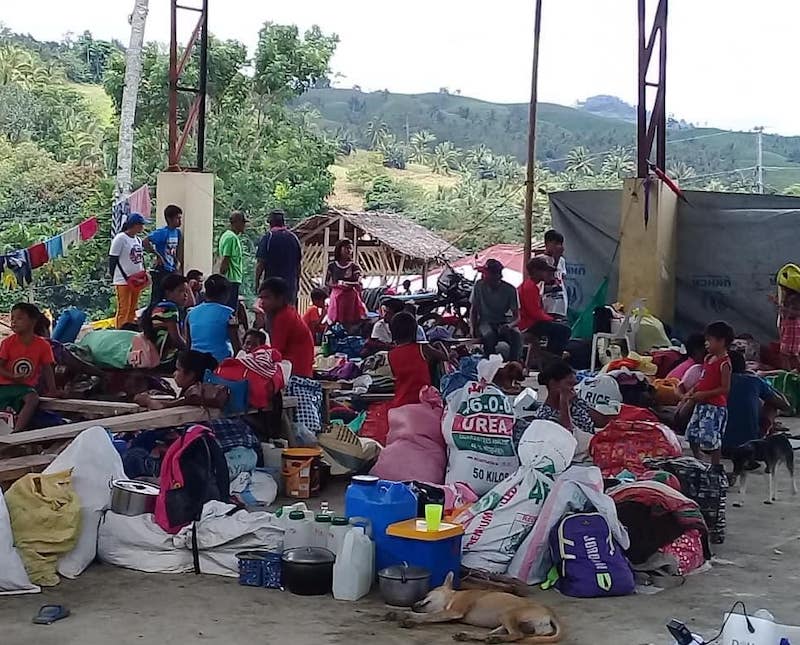
Residents of 13 sitios in Barangay Kuya, South Upi, Maguindanao, seek shelter in a covered court to avoid getting caught in a crossfire between warring forces. Photo courtesy of FROILYN MENDOZA
His fellow IP in the Bangsamoro Parliament, MP Romeo Saliga told MindaNews they sought an investigation into the killings and mass evacuations in South Upi and this was already referred to the Committee on Public Order and Safety.
Among the parties allegedly involved in the land conflict is the MILF.
Ulama, who has long been identified with the MILF and was nominated by the MILF thrice for a post, told MindaNews “wala pa man to na-confirm kung MILF ba o unsa. Mga armed men so among gina-investigate together the PNP and military” (it has not been confirmed if they were MILF. They were referred to as armed men so we are investigating together with the police and military).
He said they are still awaiting the results of the investigation. “Hapit na mahuman” (it’s almost done) and once done, he said, they will call on “mga concerned armed men, mga IP concerned, local government unit” (concerned armed men, IP concerned, local government unit).
Saliga said he hopes the rights of the IP would be protected as mandated by the Bangsamoro law.
For now, addressing land conflicts not only in Upi but in the other IP areas within the BARMM is at the level of providing relief goods and shelter during mass evacuations.
“Hindi namin pinapabayaan ang mga IP”
Ulama assured that the MIPA attends to the IP’s needs, reiterating he is a “pure-blooded IP” and will not neglect them.
He noted that it is not only in the IP areas that conflict tis experienced but also in the areas of the Moro and settlers.
His fellow IP in the Bangsamoro Parliament, MP Romeo Saliga told MindaNews they sought an investigation into the killings and mass evacuations in South Upi and this was already referred to the Committee on Public Order and Safety.
Among the parties allegedly involved in the land conflict is the MILF.
Ulama, who has long been identified with the MILF and was nominated by the MILF thrice for a post, told MindaNews “wala pa man to na-confirm kung MILF ba o unsa. Mga armed men so among gina-investigate together the PNP and military” (it has not been confirmed if they were MILF. They were referred to as armed men so we are investigating together with the police and military).
He said they are still awaiting the results of the investigation. “Hapit na mahuman” (it’s almost done) and once done, he said, they will call on “mga concerned armed men, mga IP concerned, local government unit” (concerned armed men, IP concerned, local government unit).
Saliga said he hopes the rights of the IP would be protected as mandated by the Bangsamoro law.
For now, addressing land conflicts not only in Upi but in the other IP areas within the BARMM is at the level of providing relief goods and shelter during mass evacuations.
“Hindi namin pinapabayaan ang mga IP”
Ulama assured that the MIPA attends to the IP’s needs, reiterating he is a “pure-blooded IP” and will not neglect them.
He noted that it is not only in the IP areas that conflict tis experienced but also in the areas of the Moro and settlers.
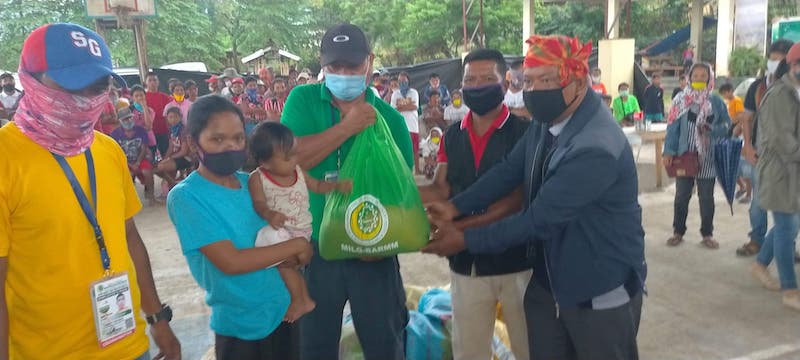
The BARMM-READi delivered relief goods to the evacuees in South Upi, Maguindanao on Monday, 01 June 2020. Photo courtesy of BARMM-READi
Whatever relief assistance is given to the Moro and Christians, he said, the IPs also receive the same.
“Natural lang siguro na hindi natin makuntento ang bawat isa sa atin pero ginagawa namin ang lahat ng aming tungkulin sa BARMM” (It is natural that not everyone will be contented but we’re doing our best here in the BARMM).
What has MIPA accomplished since the BARMM took over from the ARMM on February 26, 2019?
Ulama said they have been attending to the IPs in the different municipalities in the region to make them feel the presence of the Bangsamoro Government in what he calls a “tri-people approach.”
He acknowledged that a key to making the IPs feel the presence of the Bangsamoro Government is when the issues they have raised for decades will be finally addressed.
Addressing land rights ensures peace and development
For legal anthropologist Augusto Gatmaytan, addressing land rights in the BARMM “best ensures peace and development for IPs and Bangsamoro as it covers both vertical and horizontal dimensions of peace and development.”
In the online Lecture Series on the Rights of IPs in BARMM on July 29, Gatmaytan explained that while IPs focused on land rights “as a stepping stone to autonomy, the Bangsamoro seem to have focused historically on autonomy (secession, ARMM and BARMM), seeing the question of land rights as secondary.”
The IP approach, he said, “emphasizes horizontal relationships in specific places, while the Bangsamoro approach emphasizes the vertical relationship with the state across an area of jurisdiction.”
Whatever relief assistance is given to the Moro and Christians, he said, the IPs also receive the same.
“Natural lang siguro na hindi natin makuntento ang bawat isa sa atin pero ginagawa namin ang lahat ng aming tungkulin sa BARMM” (It is natural that not everyone will be contented but we’re doing our best here in the BARMM).
What has MIPA accomplished since the BARMM took over from the ARMM on February 26, 2019?
Ulama said they have been attending to the IPs in the different municipalities in the region to make them feel the presence of the Bangsamoro Government in what he calls a “tri-people approach.”
He acknowledged that a key to making the IPs feel the presence of the Bangsamoro Government is when the issues they have raised for decades will be finally addressed.
Addressing land rights ensures peace and development
For legal anthropologist Augusto Gatmaytan, addressing land rights in the BARMM “best ensures peace and development for IPs and Bangsamoro as it covers both vertical and horizontal dimensions of peace and development.”
In the online Lecture Series on the Rights of IPs in BARMM on July 29, Gatmaytan explained that while IPs focused on land rights “as a stepping stone to autonomy, the Bangsamoro seem to have focused historically on autonomy (secession, ARMM and BARMM), seeing the question of land rights as secondary.”
The IP approach, he said, “emphasizes horizontal relationships in specific places, while the Bangsamoro approach emphasizes the vertical relationship with the state across an area of jurisdiction.”
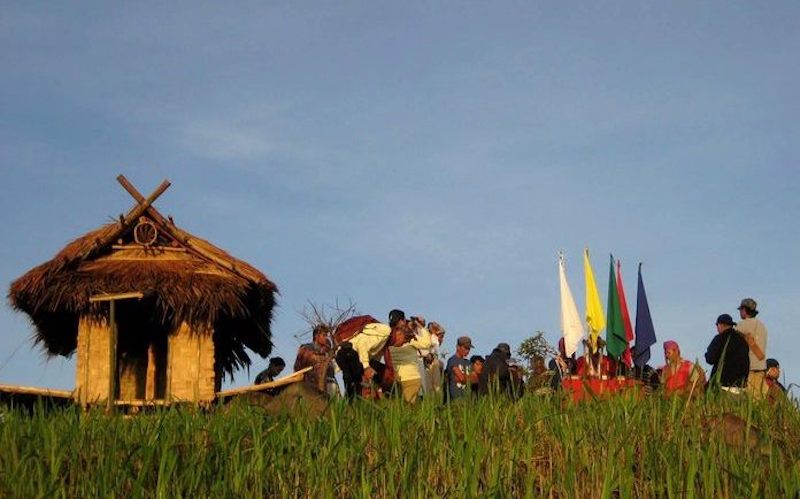
Indigenous Peoples gather for a ritual to celebrate the adoption of the United Nations Declaration on the Rights of Indigenous Peoples in September 2007 at the peak of Mt. Balalaen in Mompong, Datu Odin Sinsuat in Maguindanao, one of the historic sacred mountains for the Tedurays, according to Santos Unsad of the Teduray Justice and Governance who took this photo.
Gatmaytan said these are different approaches to the same set of problems and “can be viewed as complementary to each other.”
Addressing land rights in the BARMM, he said, provides “security to the traditional land and resource rights of Bangsamoro communities threatened by encroachments.”
For the IPs, addressing land rights in the BARMM, Gatmaytan said, “provides an opportunity to improve on the IPRA, which is a national law and is thus not completely compatible with the political and economic, cultural and inter-cultural context in the BARMM.”
The IPRA, he said, is not equivalent to indigenous law but an attempt to address historical injustices suffered by the IPs nationwide.
He explained that there are differences in ideas and practices between those provided in the IPRA and what IPs practice in their communities, citing as example the law’s neglect of communities’ economic and development rights.
IPs in the BARMM, he said, have three options in asserting their rights: invoke IPRA which is recognized by the Bangsamoro law; work with the BARMM government in the legislation of regional laws to protect their rights; and on the basis of their right to self-determination, duly recognized by the Bangsamoro law, to define another political direction for themselves.
The same options, he said, are available to all Bangsamoro peoples or communities within the BARMM who wish to protect their lands and resources, rights and interests from outside interference.
“The sooner the BARMM government acts to protect IP land and resource rights within the region, the sooner it can help ensure peace and development of IP and Bangsamoro communities,” Gatmaytan said. (Carolyn O. Arguillas / MindaNews)
Gatmaytan said these are different approaches to the same set of problems and “can be viewed as complementary to each other.”
Addressing land rights in the BARMM, he said, provides “security to the traditional land and resource rights of Bangsamoro communities threatened by encroachments.”
For the IPs, addressing land rights in the BARMM, Gatmaytan said, “provides an opportunity to improve on the IPRA, which is a national law and is thus not completely compatible with the political and economic, cultural and inter-cultural context in the BARMM.”
The IPRA, he said, is not equivalent to indigenous law but an attempt to address historical injustices suffered by the IPs nationwide.
He explained that there are differences in ideas and practices between those provided in the IPRA and what IPs practice in their communities, citing as example the law’s neglect of communities’ economic and development rights.
IPs in the BARMM, he said, have three options in asserting their rights: invoke IPRA which is recognized by the Bangsamoro law; work with the BARMM government in the legislation of regional laws to protect their rights; and on the basis of their right to self-determination, duly recognized by the Bangsamoro law, to define another political direction for themselves.
The same options, he said, are available to all Bangsamoro peoples or communities within the BARMM who wish to protect their lands and resources, rights and interests from outside interference.
“The sooner the BARMM government acts to protect IP land and resource rights within the region, the sooner it can help ensure peace and development of IP and Bangsamoro communities,” Gatmaytan said. (Carolyn O. Arguillas / MindaNews)

No comments:
Post a Comment
Note: Only a member of this blog may post a comment.